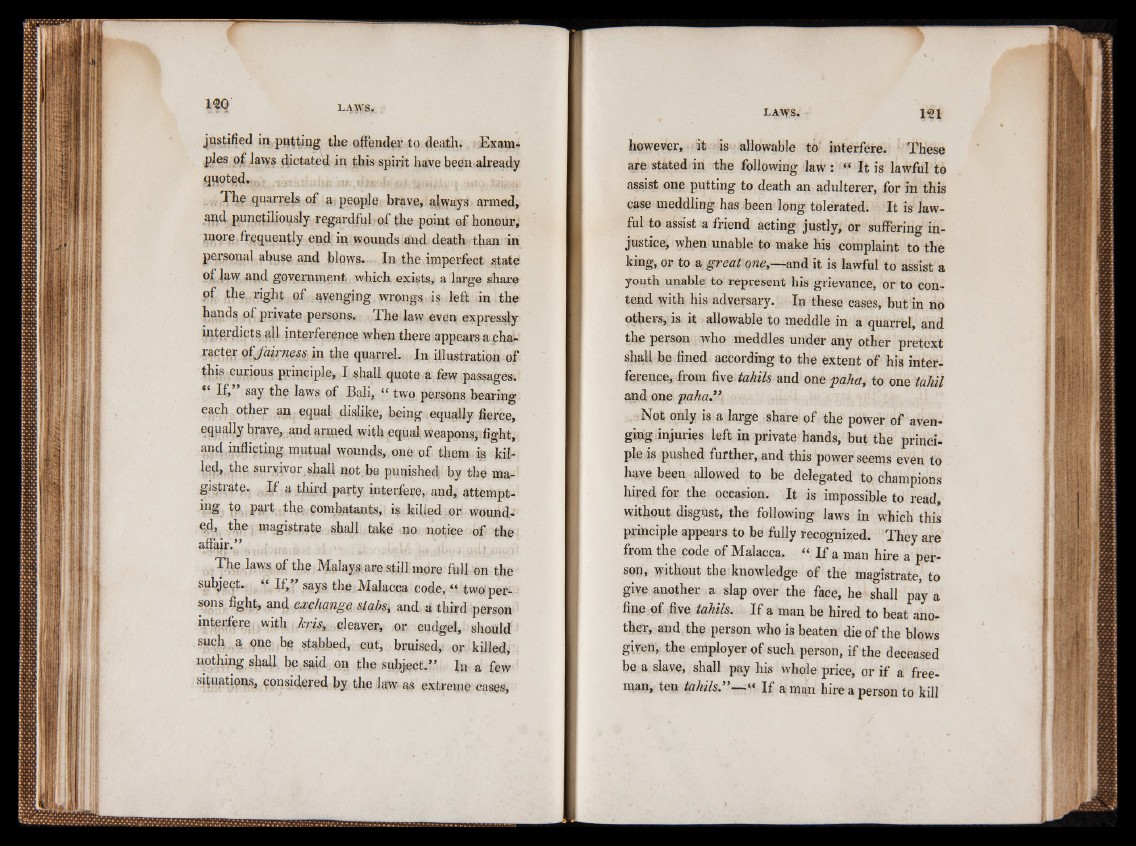
justified in putting the offender to death. Examples
of laws dictated in this spirit have been already
quoted.
The quarrels of a people brave, always armed,
and punctiliously regardful of the point of honour,
more frequently end in wounds and death than in
personal abuse and blows. In the imperfect state
of law apd government which exists, a large share
of the right of avenging wrongs is left in the
h&P^s °f private persons. The law even expressly
interdicts all interference when there appears a cha-
ìacte.r of fairness in the quarrel. In illustration of
this curious principle, I shall quote a few passages.
If, say the laws, of Bah, “ two persons bearing
each other an equal dislike, being equally fierce,
equally brave, and armed with equal weapons, fight,
and inflicting mutual wounds, one of them is killed,
the survivor shall not be punished by the magistrate.
If a third party interfere, and, attempt-
pmt the combatants, is killed or wound-
erd, the j magistrate shall take no notice of thè
affair.”
The laws of the Malays are still more full on the
subject. “ If,” says the Malacca code, “ two persons
fight, and exchange slabs, and a third person
interfere with kris, cleaver, or cudgel, should
such a one be stabbed, cut, bruised, or killed,
nothing shall be said 011 the subject.” In a few
situations, considered by the Jaw as extreme cases,
however, it is allowable to interfere. These
are stated in the following law : “ It is lawful to
assist one putting to death an adulterer, for in this
case meddling has been long tolerated. It is lawful
to assist a friend acting justly, or suffering injustice,
when unable to make his complaint to the
king, or to a great one,—and it is lawful to assist a
youth unable to represent his grievance, or to contend
with his adversary. In these cases, but in no
others, is it allowable to meddle in a quarrel, and
the person who meddles under any other pretext
shall be fined according to the extent of his interference,
from five tahils and one paha, to one tahil
and one paha.”
Not. only is a large share of the power of avenging
injuries left in private hands, but the principle
is pushed further, and this power seems even to
have been allowed to be delegated to champions
hired for the occasion. It is impossible to read,
without disgust, the following laws in which this
principle appears to be fully recognized. They are
from the code of Malacca. “ If a man hire a per-
, knowledge of the magistrate, to
give another a slap over the face, he shall pay a
fine of five tahils. If a man be hired to heat another,
and the person who is beaten die of the blows
given, the employer of such person, if the deceased
be a slave, shall pay his whole price, or if a freeman,
ten tahils. — If a man hire a person to kill